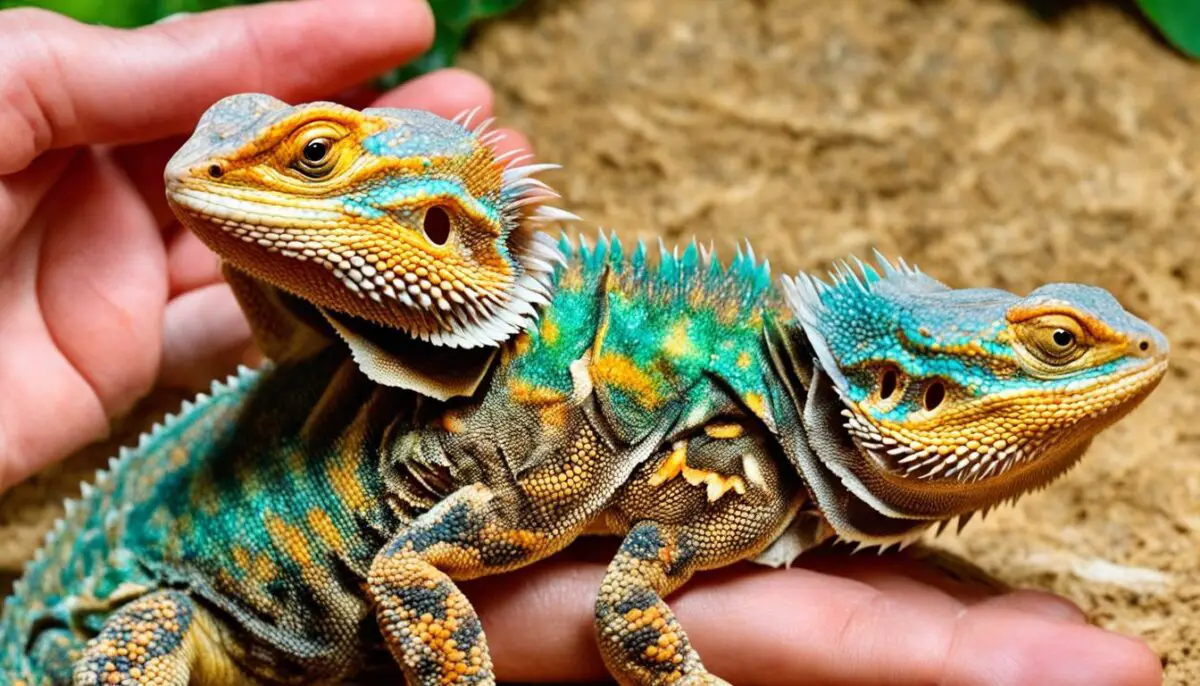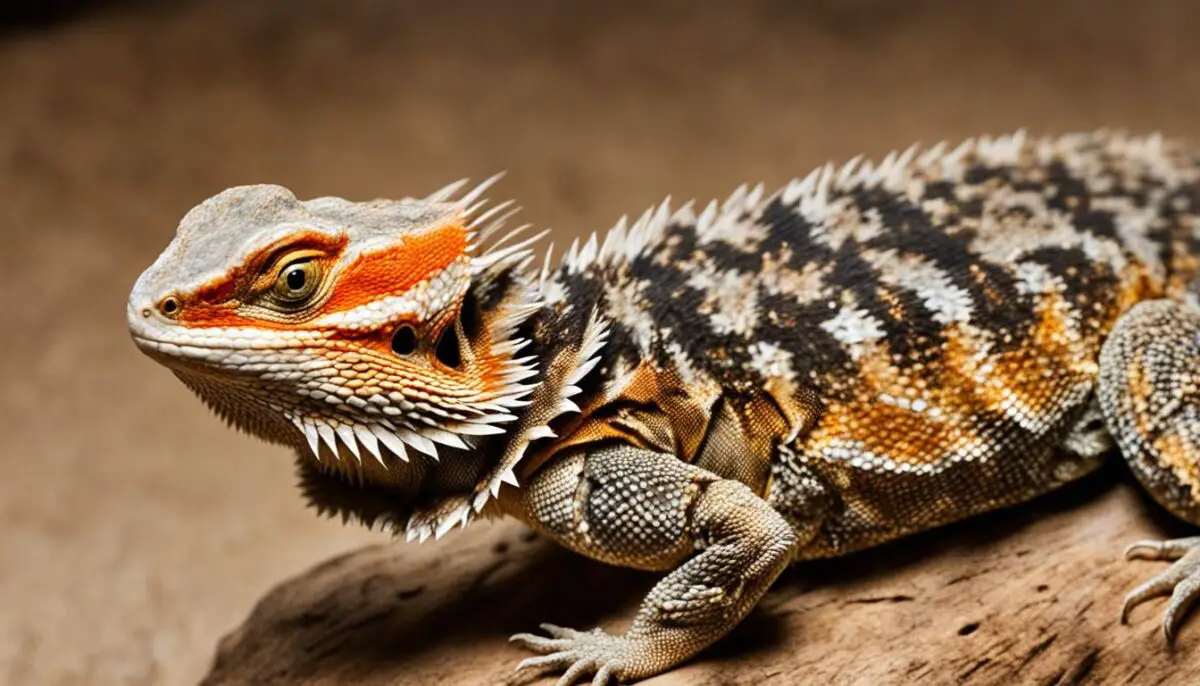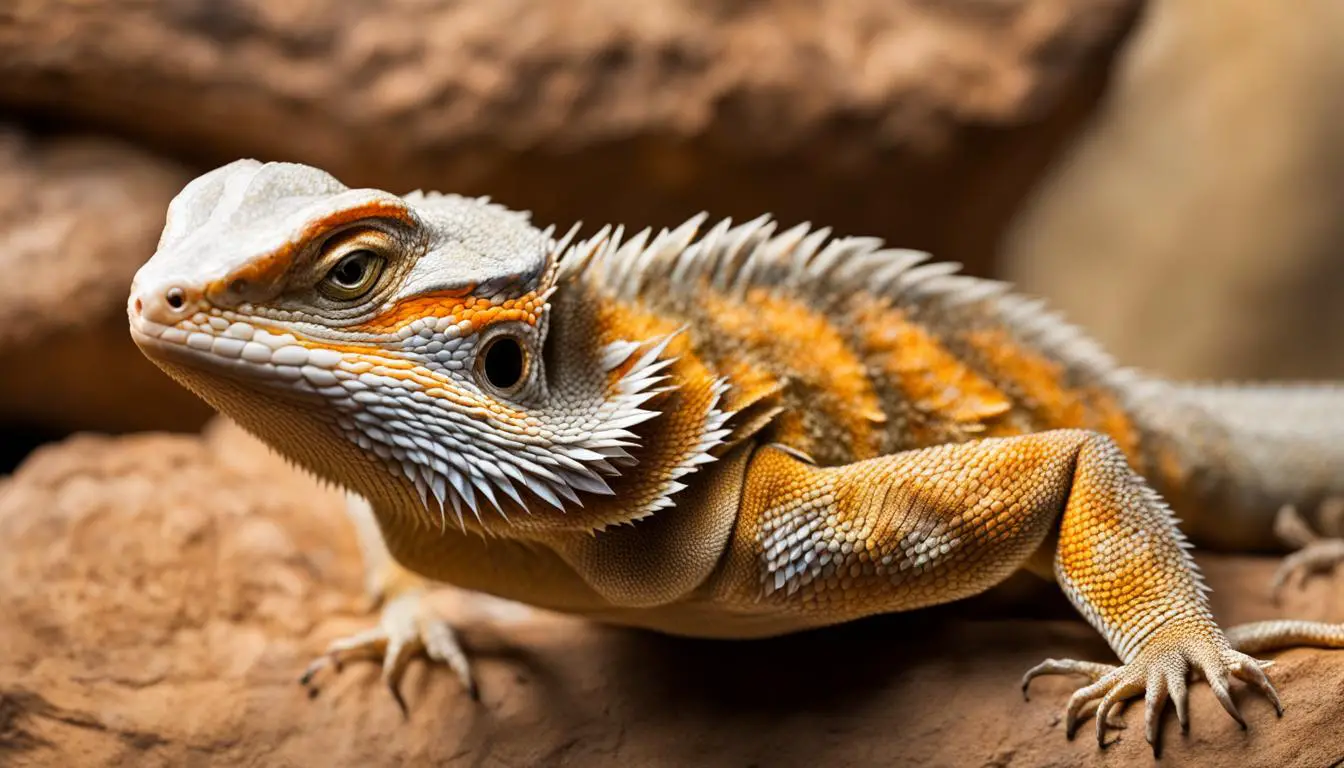Bearded dragons are fascinating creatures and a popular choice for reptile enthusiasts. While they may not seem like the most likely candidates for reproduction, female bearded dragons can actually lay eggs even if they haven’t been with a male. In this article, we will explore the signs of a pregnant bearded dragon and provide tips on how to care for them during their pregnancy.
One of the most noticeable signs of a pregnant bearded dragon is a larger belly. As the female prepares to lay eggs, her belly will become fuller and more rounded. You may even be able to feel the eggs inside her belly, which will feel like small marbles. Along with a change in belly size, pregnant bearded dragons may also exhibit lethargy and clumsiness.
It’s important to create a suitable nesting area for a gravid bearded dragon. This area should have moistened bedding to mimic the ideal conditions for egg laying. Bearded dragons typically lay around 20 eggs per clutch and can lay multiple clutches in a season. However, it’s crucial to note that retaining eggs for over 45 days can be life-threatening, and veterinary attention may be necessary.
Once the eggs are laid, they can be incubated to increase the chances of successful hatchings. The incubation period for bearded dragon eggs is typically around 55 to 75 days. During this time, the eggs should be kept in a controlled environment with proper temperature and humidity levels.
Key Takeaways:
- A pregnant bearded dragon will have a larger belly and may exhibit signs of lethargy.
- The eggs in a pregnant bearded dragon’s belly can be felt and will feel like marbles.
- Proper care and a suitable nesting area are crucial for the health of both the dragon and the eggs.
- Retaining eggs for over 45 days can be life-threatening, requiring veterinary attention.
- Bearded dragon eggs can be incubated for 55 to 75 days to increase hatch success rates.
Caring for a Gravid Bearded Dragon
When it comes to bearded dragon care, proper nutrition and extra attention are crucial for gravid (pregnant) bearded dragons. Providing the right diet and environment will ensure the health of both the mother dragon and her developing eggs.
Gravid bearded dragons require a calcium-rich diet to support healthy egg development. Along with a staple diet of commercial bearded dragon food, it is important to supplement their meals multiple times a week with calcium dusted on their food. This helps prevent calcium deficiency, which can lead to metabolic bone disease.
Additionally, incorporating a variety of green vegetables and fruits into their diet will provide essential vitamins and minerals. Bearded dragons are also insectivores, so offering additional insect snacks like crickets or mealworms can be beneficial for their nutrition.
Creating a warm and comfortable environment is essential for gravid bearded dragons. They require a basking spot with a heat lamp to maintain optimal body temperature. Exposure to UVB light is also important for their overall health and calcium absorption.
Bathing your gravid bearded dragon regularly helps with hydration and stimulates natural behaviors. It is recommended to let your dragon soak in shallow lukewarm water for a short period of time, allowing them to drink and absorb moisture through their skin.
Exercise is equally important for gravid bearded dragons. Regular supervised time outside of their enclosure allows them to stretch their muscles and maintain their muscle tone.
Providing a suitable nesting area for the gravid bearded dragon is vital. This includes a safe and secluded space with appropriate moistened bedding. Monitoring the temperature and humidity levels in the nesting area is crucial for the health and development of the eggs.
If you are planning to breed bearded dragons, it is advisable to invest in an incubator for higher hatch success rates. Caring for the eggs can be a tedious task, as it requires maintaining specific temperature and humidity levels throughout the incubation period.
“Proper care and nutrition are essential for the health of gravid bearded dragons and their developing eggs. Creating a suitable environment, providing a calcium-rich diet, and monitoring temperature and humidity are key factors in ensuring successful reproduction.”

Signs of a Pregnant Bearded Dragon
Recognizing the signs of a pregnant bearded dragon is crucial for providing the proper care and support during this important time. Here are some key indicators to look out for:
- Belly Size Change: One of the most noticeable signs of a gravid bearded dragon is a change in belly size. As the eggs develop, the belly becomes fuller and more rounded. This growth can sometimes cause clumsiness in the dragon.
- Egg Sensation: Gently touching the belly can help determine if there are eggs present. When palpated, the eggs can feel like a bag of marbles, providing a definitive clue to the dragon’s gravid condition.
- Pregnancy Duration: Bearded dragons usually carry their eggs for approximately one to six weeks, depending on various factors such as temperature and overall health. During this time, it is important to provide proper care and nutrition to support the dragon’s well-being and ensure optimal egg development.
Identifying behavioral changes is also essential in detecting the early stages of pregnancy.
Common Behaviors to Watch for:
- Digging: Pregnant bearded dragons may exhibit digging behaviors, preparing for nesting by creating a suitable environment for egg deposition.
- Restlessness: Restless behavior, such as increased activity or pacing, can be an indication of pregnancy. The dragon may seem more alert and actively explore its surroundings.
Understanding these signs and behaviors is essential in providing the appropriate care and support for a pregnant bearded dragon. By monitoring these changes and providing a conducive environment, you can ensure the health and well-being of both the dragon and its developing eggs.

What to Do with One Bearded Dragon
If you have one bearded dragon and discover that it’s a female, you may wonder what to do with her in terms of breeding and reproduction. Interestingly, bearded dragons have the ability to lay eggs even if they haven’t been around a male. However, it’s important to note that unfertilized eggs will not hatch.
If you mistakenly identified your bearded dragon’s sex or unexpectedly discover that she is pregnant, it’s recommended to consult a veterinarian to ensure there are no underlying health issues. Unusual behavior or changes in appetite could indicate potential complications. One common issue that can arise during egg-laying is egg binding, where the female dragon has difficulty expelling the eggs. This condition can be life-threatening and requires prompt veterinary attention.
Proper care and support are crucial for the well-being of your bearded dragon during this time. Ensuring she has a suitable nesting area and providing a balanced diet that includes calcium-rich foods will contribute to her overall health. Monitoring temperature and humidity levels is also essential for successful egg incubation.
Remember, breeding and reproduction should only be pursued with careful consideration and adequate knowledge of the process. It’s essential to prioritize the health and well-being of your bearded dragon above all else.
Conclusion
Breeding bearded dragons can be a rewarding but demanding endeavor. The health of both the female dragon and the developing eggs relies on proper care and nutrition. Providing a suitable nesting area, diligently monitoring the temperature and humidity, and utilizing an incubator can significantly increase the chances of successful hatchings.
Being aware of the signs of a pregnant bearded dragon is essential for timely intervention and seeking veterinary attention for any concerning behavior or complications. By understanding and properly caring for a pregnant bearded dragon belly, we contribute to the overall well-being of both the dragon and the eggs.
Whether you are an enthusiast or a first-time breeder, reptile health and lizard reproduction should always be a priority. With the right knowledge and dedication, we can ensure the safe and successful journey of bearded dragon pregnancy and bring new life into the world of these fascinating reptiles.
FAQ
Can female bearded dragons lay eggs without being with a male?
Yes, female bearded dragons can lay eggs even if they haven’t been around a male. However, unfertilized eggs will not hatch.
What are the signs of a gravid bearded dragon?
Some signs of a gravid bearded dragon include lethargy, a larger belly, nesting behaviors, and a need for a proper nesting area with moistened bedding.
How many eggs do bearded dragons typically lay per clutch?
Bearded dragons typically lay about 20 eggs per clutch and can lay multiple clutches in a season.
Can retaining eggs for over 45 days be dangerous?
Yes, retaining eggs for over 45 days can be life-threatening, and veterinary attention may be necessary.
How long do bearded dragon eggs take to hatch?
If the eggs are fertile, they can be incubated for 55 to 75 days before hatching.
What should you feed a gravid bearded dragon?
Gravid bearded dragons require a calcium-rich diet and supplements multiple times a week. Green vegetables, fruits, and additional insect snacks are also beneficial for their nutrition.
What kind of environment does a gravid bearded dragon need?
A gravid bearded dragon needs a warm environment with a heat lamp and exposure to UVB light. Bathing and exercise can help with hydration and muscle tone.
How should I care for the eggs of a bearded dragon?
It’s advisable to use an incubator for higher hatch success rates. Proper temperature and humidity monitoring is crucial for the health of the eggs.
How can I tell if my bearded dragon is pregnant?
One of the most noticeable signs of a gravid bearded dragon is a change in belly size. The belly becomes fuller and more rounded, sometimes causing clumsiness in the dragon. A gentle touch to the belly can help determine if there are eggs; they will feel like a bag of marbles.
What should I do if I suspect my bearded dragon is pregnant?
If you suspect your bearded dragon is pregnant, it’s important to provide proper care and nutrition during this time to support the dragon’s health and egg development. Common behavioral changes, such as digging and restlessness, can also indicate pregnancy.
Are there any complications associated with bearded dragon pregnancy?
Yes, complications such as egg binding can occur, so prompt veterinary attention is necessary to avoid potentially life-threatening situations.
What should I consider if I want to breed bearded dragons?
Breeding bearded dragons can be a rewarding but demanding endeavor. It’s important to understand and properly care for both the female dragon and the developing eggs. Providing a suitable nesting area, monitoring temperature and humidity, and using an incubator can increase the chances of successful hatchings.


